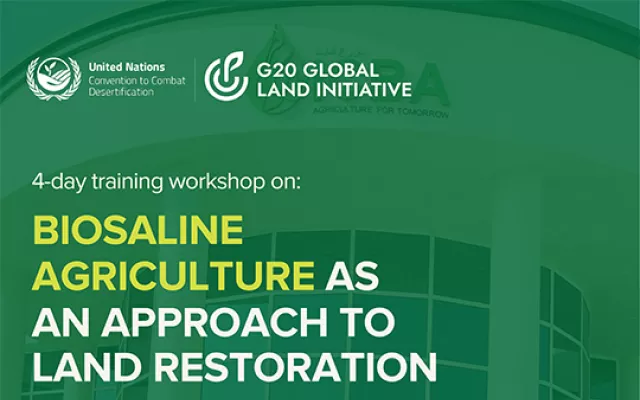ICBA Round Table Meeting with Central Asia Partners
19 May 2013
The International Center for Biosaline Agriculture (ICBA) has organized a round table meeting, in Dushanbe on 19 May 2013, with various distinguished agriculture and research organizations from the Central Asia region. Dr. Ismahane Elouafi, Director General of ICBA, chaired the meeting, where each participant presented his institution, highlighted the current problems, and identified potential projects for cooperation and collaboration over the short and medium run.
Dr. Shoaib Ismail, Halophyte Agronomist, provided a presentation about ICBA. From Azerbaijan, there was a representative from the Institute of Botany of the Academy of Sciences. As from Kazakhstan, there were representatives from the Scientific Center on Biotechnology and from theInstitute of Plant Husbandry both of which are part of the Ministry of Agriculture. In addition, there was a representative from KazAgro Innovation. From Kyrgyzstan, representatives of the National Academy of Sciences and the Innovation Centre of Phytotechnologies National Academy of Sciences were present as well. From Tajikistan, there were delegates from the Institute of Soil Research and the Tajik Academy of Agricultural Sciences. Present from Turkmenistan was the representative of the Institute of Flora & Fauna from the Ministry of Nature Protection. Moreover, from Uzbekistan, there were commissioners from the Scientific Centre for Agriculture of the Ministry of Agriculture and Water Economy and from the Uzbek karakul Sheep Breeding and Desert Ecology Institute.
In addition, present from Russia was the representative of the Eurasian Center for Food Security of Lomonosov Moscow State University. As well as, there were representatives of regional organizations and the Islamic Development Bank (IDB).
Following the discussion, it was clear that many issues were common to the Central Asia region such as dependence on irrigation, salinity, low soil fertility, water scarcity and contamination, groundwater, decreasing land productivity, importance of technical capacity development, up to date curricula for advanced education, and results realized but not disseminated practically into development initiatives.
A number of promising solutions and innovations were identified such as biotechnology, availability of data, mechanization, and other technologies like greenhouses, appropriate crops, and management. However, it is critical that policy and legislation play an instrumental role in supporting appropriate management and research to support those initiatives. 
Moving forward it is important to establish more dialogue and knowledge sharing opportunities, more sharing of genetic resources and expertise, and establish collaborative projects and approaches to donors, especially to IDB, emphasizing regional approach that contributes to national and local challenges.
The various parties in the meeting agreed on the necessity to step up the level of coordination and collaboration. They need to get results better understood and more widely disseminated especially into development programs. In addition, technical solutions are required but not enough; land and water management and planning is required including socio economic components. As well as, capacity building is a critical component of the solution.
There was a great appreciation for the meeting and to ICBA for organizing it from the various. Dr. Fawzi Al Sultan, Chairman of ICBA, concluded that ICBA has a history of working in partnership. Countries know the problems and in many cases what are the solutions. And many already have the capacity required to tackle these problems. He added, that most of the Central Asian countries have a common set of problems that challenge food production. However, without the right policies, change will not happen. Thus sending a unified message to the government would help in mobilizing legislations and policies that will put the road to the solution in motion. Fawzi ended by highlighting the benefits in ensuring effective communication to all stakeholders.










